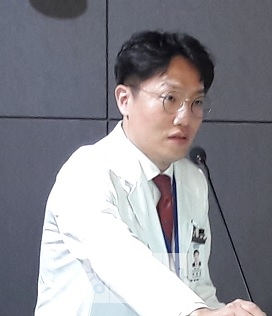To cope with new infectious diseases properly, Korea needs to have high-level isolation units and form multidisciplinary teams that can treat various severe underlying problems, experts said Tuesday.
“The nation should have a monitoring system that can detect infectious diseases at early stages and aggressively prepare for their occurrences and emergency communication,” said Professor Choe Pyoeng-gyun 최평균 of Seoul National University Hospital서울대병원. “Equally crucial is to provide proper treatments for patients, according to the scale and severity of the diseases’ occurrence.”
According to Professor Choe, the importance of high-level isolation units has increased since the big spread of Ebola virus in 2014. The mortality rate in South Africa where the virus occurred was more than 70 percent, but the rate in Europe and the U.S. with facilities and staffs that could provide proper treatments was only 18.5 percent.
“The government has secured negative pressure rooms after the outbreak of Severe Acute Respiratory Syndrome (SARS) in 2003, but most of them were in public hospitals, which resulted in the discrepancy between treatment facilities and medical teams who treat patients,” Choe said.

The SNUH professor emphasized that it is essential to form multidisciplinary teams that allow for the participation of the professional medical workers who can treat various severe underlying problems, in addition to expanding high-level isolation units, for preventing new infectious diseases.
“The high-level isolation units are a prerequisite to guarantee the safety of the infectious diseases management system,” Choe said. “Also crucial is to form multidisciplinary teams, which include specialists from infectious disease department and specialists treating critical patients to provide the best treatment for patients.”
Professor Choe also stressed the need to form a “consultative body composed of medical staffs at isolation units” and decide patient allocations not based on the administrative decision but on patients’ clinical traits and the possibility of providing best treatments. “Eventually, the consultative body should proceed with forming networks to cope with new infectious diseases and providing training,” he said.
Professor Lee Hee-young이희영 at Seoul National University Bundang Hospital분당서울대병원 pointed to the need to have a protocol to deal with infectious diseases efficiently while emphasizing SNUH should play a role in making the protocol.
“Medical staffs should be able to share and learn a limited number of cases occurring in Korea,” Lee said. “SNUH has to model its treatment experiences and know-how and share them with other hospitals. I hope it needs to make a standard version that other hospitals can follow.”
Some participants in the workshop pointed out that the nation cannot block the inflow of new infectious diseases with the current disinfection system, calling for changing the national disinfection paradigm.
“We learned from the MERS incident that current disinfection system couldn’t prevent new infectious diseases,” said Oh Myung-don오명돈, another SNUH professor. “The first guard posts to prevent new infectious diseases are no longer quarantine stations but medical institutions.”
"The national quarantine paradigm should change from the administration- and management-oriented system to the one focusing on medical fields and clinical trials,” Professor Oh said. “The participation of not just the government and medical institutions but of the general public and local communities is also essential to strengthen the national disinfection ability.”

